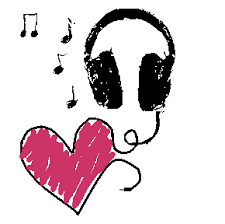and what one might call the spiritual connection we humans have to it: its ability to get deep down into your soul and compel you to act, whether that action be singing along at the top of your lungs, or dancing, or crying, or lipsyncing, or tapping your foot, or sighing. Music acts as this great equalizer, because even though people from certain backgrounds are more likely to enjoy certain kinds of music over others, a good love song, regardless of genre, can make anyone say "I want that" or "I remember that." A good song about pain can elicit from anyone this sense of "Yes, I hear you. I have been there too." In my humble opinion, you'd be hard pressed to find anything else so profoundly social, anything else that brings people together like that--concerts are one place where, even in 2011, you can find evidence of Emile Durkheim's concept of collective effervescence. Anyway, there are lots of things I want to say about music, but I found this via my friend N's tumblr last night, and I'm not sure I've ever read a blog post that has more truth in it than this:
" On Music And Melancholy
how you felt, feel, thought but never what you articulated. The chaotic buzz of emotion is given order, and thus made understandable.
These singers sound like they put a little piece of themselves into every note. The force of their personality powers the key changes that make the hair on the back of your neck stand up. The harmonies are invested with an emotion so personal, it’s inevitable that the listener picks up the feeling as if it’s contagious, whether melancholy, regret or exhilaration. They really mean every word and trill.
And then you have to sing along. It’s primal, it’s beautiful. But you know you’ll never hit the notes and probably won’t be in time. You don’t care. There’s the urge to shout me too within the safe confines of the song. Not just “me too”, but “us together” and, most importantly, “I understand”. It’s so easy to feel close to singer/songwriters who seem to reach right into your head and project all of this onto a ten-foot tall billboard. Sing yourself hoarse.
This is the song that says it all – you need to strap that person down and say, “Sit still. Stop struggling, you won’t get free. Listen. This is what I need to say to you. But I’m not articulate enough, brilliant enough, or brave enough.” Bravery is what it comes down to. Songs that can touch raw emotion are also a remarkable display of vulnerability; the writer puts his or her innermost thoughts out for the world to listen to. It must be incredibly scary to commit your memories to the recording studio, but also freeing. And, if you do it well, satisfying.
More than writing, music is able to pull at the loose threads of the patchwork of memory and feeling; it can approach its audience with the eloquence of the written word and so much more. A beautiful harmony, the rise of a crescendo and the skilful use of an occasional silence that forces attention. Certain songs are able to hotwire your inner circuit board, take you for a spin and burn out the brakes. Music can hit you straight in the vulnerables when you least expect it.
I take refuge in ambiguity and vagary; it’s safer and easier. You can’t pin down fog, and fog has a great deal more consistency and substance than the nonsense I throw around on a daily basis. It’s easier to work with people you don’t like if you don’t express it explicitly. It’s easier to say, “I’m busy” than “I’m miserable, and I keep having dreams that I’ve forgotten how to breathe.” Much of the time, I’m not brave enough to say exactly what I’m thinking. It is a major downfall. I’ve known brave people, loved them, hated them, and been incredibly hurt by them occasionally. But at least they said what they thought. Of course, there are consequences to always speaking your mind, so perhaps a degree of self-censorship is a good thing.
But I wish that I could express myself with the fluency and efficiency of my favorite songs. It’d be so much simpler. Unfortunately, my vocal range is more suited to a rendition of ‘Smellycat.’ Maybe it’s time to give good old-fashioned talking a go."

No comments:
Post a Comment